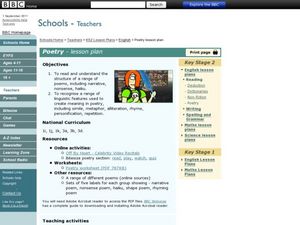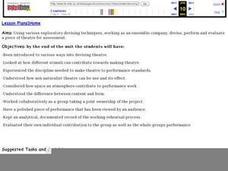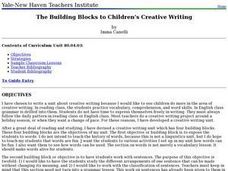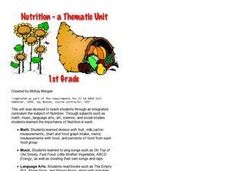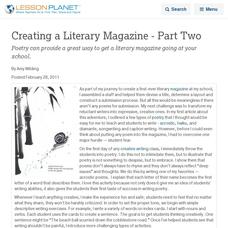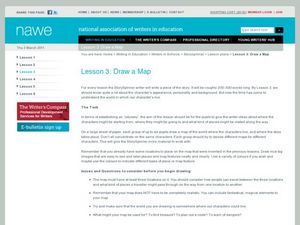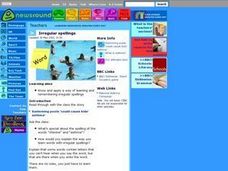Curated OER
Different Types of Poetry
Provide pupils samples of different types of poems including haikus, narrative, nonsense, shape, and rhyming poems. In groups, class members read the poems, establish their general meaning, identify poetic devices, and rate the poems,...
Poetry Class
How to Make a Poem
Even reluctant writers will be able to craft poems using the poem making kit provided by this resource.
Poetry Society
Simile and Metaphor
Young poets use word cards to prompt a metaphor poem comparing to very dissimilar items.
Curated OER
Haiku and Cinquain
As you introduce your scholars to haiku and cinquain poetry, give them plenty of opportunity to practice. This brief worksheet gives an example of each, then scaffolds the syllable breakdowns for writers to create two poems of their own...
Curated OER
Fish Swimming--A Poem by Moniza Alvi
In this poetry analysis worksheet, students read the poem "Fish Swimming," and discuss the metaphors in the poem. Students complete eight activities based on the poem, including rewriting the subject of the poem and watching two...
Curated OER
Deciphering the Mechanics of Poetry
Eighth graders analyze a variety of poems to develop the ability to recognize and explain a variety pf poetic devises.
Curated OER
Theatre: Exploratory Techniques
Using various exploratory techniques, young actors work as an ensemble company to devise, perform and evaluate a piece of theatre for assessment. This outline provides an objective and a list of games and activities that stimulate skills...
Curated OER
Creative Writing: Children's Building Blocks
Your class can participate in a writing program involving four building blocks. By exploring words, sentences, writing forms, and story organization, they improve their creative writing skills throughout this year-long unit. Early in the...
Curated OER
Original Rhythm Compositions for Poetry
Students create and perform original musical compositions using poetry as a basis for the creative process. This cross-curricular two-day lesson can be done in two 45 minute class periods. Students evaluate performances as part of...
Curated OER
Nutrition: A Thematic Unit
Young learners explore nutrition and the food groups in these two mini-lesson plan ideas. First, kindergarteners have a discussion about their health and how different foods contribute to it before making their own personal food pyramid....
Curated OER
HEALTHY EATING
High schoolers devise their own scheme for encouraging healthy eating and discuss health eating. They prepare a talk for younger students from the government to promote healthy eating.
Curated OER
Creating a Literary Magazine - Part Two
Poetry can provide a great way to get a literary magazine going at your school.
Curated OER
Theatre
Learners, in groups, explore how to devise theatre and produce a polished piece to perform in front of an audience.
Curated OER
Looking for Newton
Students discuss the rhyming pattern of various types of poetry. With a focus on limericks, they follow the specific rhyme scheme and create a limerick about Newton. They share their poem with the class and write another one related to...
Curated OER
Diwali
Students discover festivals and traditions of South Africa. Students discuss the meaning of Diwali and why it is celebrated. They devise an assembly about the religious festival of lights. Students explain why Hindus, Jans and Sikus...
Curated OER
Research - Roald Dahl
Students listen to one of Dahl's poems or complete one of his books. They then research using the official Roald Dahl website and navigate some of the areas to familiarize themselves with some of the content to enable them to answer...
Curated OER
Treasure to Ship
Second graders explore and solve an algebraic word problem. They listen to a poem about pirates, describe the word problem in their own words, and independently solve the problem using colored rods to represent the pirates and treasure...
Curated OER
Draw a Map
Students draw a map. In this map drawing lesson students draw a map to show where a character is from and where they are going in the story. Students are writing an odyssey.
Curated OER
Sonnet Form
Students explore the sonnet form. In this lesson on sonnet form, students explore various sonnets and how a sonnet can range from conventional to experimental.
Curated OER
Geology
Fourth graders devise a workable inch-to-inch scale for a geologic timeline sequencing the eras covered in the unit. They hypothesize from descriptions of dinosaur fossil evidence.
Curated OER
The Big Lie
Fifth graders create poems and other forms of writing.Then working in groups they share writing with each other. The opinions would be gathered and students would revise writing according to the comments.
Curated OER
Irregular Spellings
Students know and apply a way of learning and remembering irregular spellings. Students show where irregular spellings can be found everywhere in our society today. Students tie in irregular spellings to silent letters as well.
Curated OER
The History of Writing
The history of written communication can be an interesting addition to history lessons.
Curated OER
Oedipus The King: An Introduction To Greek Drama
Students gain insight into Greek tragedy and such concepts such as fate, hubris, and (dramatic) irony. They recognize the Greeks concern with fate, self-determination and the role of gods and oracles in everyday life and compare and...


